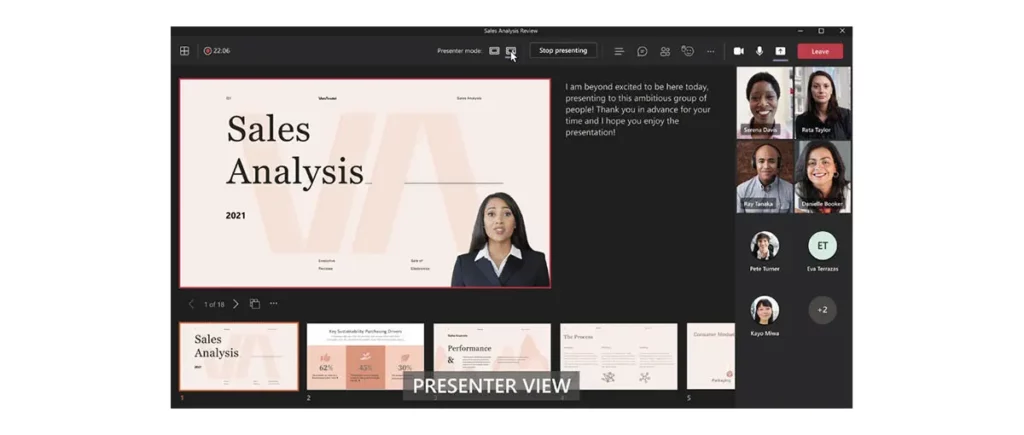Microsoft Teams is not just a simple messenger, but rather a communication platform and central interface to other Microsoft 365 applications, such as SharePoint or Tasks from Planner and To Do. Therefore, the new features also come from different areas and support everyday life in various ways. For example, they help with presenting, promote interaction and collaboration, increase productivity, and even pay attention to a balanced work-life balance.
Increasing the Quality of Presentations
Presentations are an important part of many meetings, from introducing the project plan to regular status updates from individual teams to presenting the final report at the end of the project. Therefore, new features in this area are a great support in everyday life.
The Presentation Mode
With the presentation mode, the presenter can customize the display of their content for meeting participants individually. It is reminiscent of the setup of news anchors. The presented presentation is in the background and the camera image can be dynamically placed. This allows for more dynamic visualization without participants having to switch between the presenter and the shown presentation. Thus, the presenter can also reach their audience through gestures and facial expressions.
There are different layout variants for placing the speaker’s camera. The “Standout” mode shows the presenter’s video feed as a silhouette in front of the shared content. In the “Reporter” view, the presentation is placed over the speaker’s shoulder as in the news. The “Side-by-Side” layout shows the presenter next to the presentation content.
Additionally, the presentation mode offers participants the opportunity to navigate through the slides themselves. The presenter can control this function by activating or deactivating the eye icon.
Presentation mode in Microsoft Teams (Source: Microsoft)
Resume Presentation or Start from the Beginning
With this feature, Microsoft Teams allows presenters, as well as any user with access to the shown file, to pause the presentation and resume it at the same point at a later time. So when a file is shared again in a meeting, one can choose whether to continue the presentation or start from the beginning.
Promoting Interaction and Collaboration
To make collaboration between colleagues in the home office as productive as possible and to simplify their interaction even in larger online meetings, Microsoft Teams offers interesting new features.
Breakout Rooms
Microsoft Teams now offers the possibility to temporarily divide a meeting into several meeting rooms. In these so-called breakout rooms, dedicated groups of meeting participants can then retreat to work on specific topics in smaller groups. They are ideal, for example, for short brainstorming sessions, more intensive discussions, or creative workshops.
The number of breakout rooms is freely selectable (max. 50) and the presenter can set the time limit. When the time is up, the rooms are automatically closed and the participants return together with the others to the main meeting. Meeting participants can be assigned to the respective group rooms either automatically or individually manually.
Breakout Rooms in Microsoft Teams (Source: Microsoft)
Live Captions
Live captions can be activated in Microsoft Teams meetings. These live transcripts provide the ability to follow in real-time what was said and who said it. After a meeting, the transcript file is automatically saved in the chat tab for that meeting. This feature is currently only available in English.
Reactions
To make interactions during meetings more interesting and to allow muted participants to express their agreement, for example, live reactions were introduced. Meeting participants can react directly, either with a like, love, applause, or laughter.
Live reactions in Microsoft Teams (Source: Microsoft)
Increasing Daily Productivity
Since time is money, as we know, Microsoft Teams strives to enable us to have the most efficient and productive workday possible.
5 Minutes Remaining
This feature ensures better time management during meetings by visibly notifying everyone 5 minutes before the scheduled meeting duration ends. This notification allows participants to wrap up cleanly, for example, to briefly summarize the results or distribute the discussed tasks.
Sharing Emails in Microsoft Teams
If you want to share the content of a relevant email with a chat or channel in Teams, you can now share the email directly from Outlook to Teams. In Teams, a preview of the email is then displayed in the corresponding channel or chat.
Sharing emails from Outlook in Microsoft Teams (Source: Microsoft)
Summary
Missed a meeting? No problem, as Teams now offers a summary of completed meetings. Under the Meeting Chat tab, both recording, transcription, chat, and shared files are automatically stored after the meeting ends.
Reply to Messages Directly
Replying directly to chat messages by quoting the original message creates a direct reference and thus prevents misunderstandings. Seeing immediately which message is being referred to increases the efficiency of communication and makes the context clearer faster. This function is already integrated on smartphones; for the desktop application, it is announced for Q2.
Chat Bubbles in Meetings
Until now, switching between video calls and chats has been rather cumbersome. To simplify this and save time, Microsoft Teams wants to introduce chat bubbles. So if something is written in the meeting chat during a meeting, the message appears on the screens of all participants, thus bringing the content of the chat more into focus.
Promoting a Balanced Work-Life Balance
Several features are even dedicated to promoting a better work-life balance. They provide new personal insights that are intended to help reshape the workday and increase well-being.
Headspace Integration
Headspace is a mindfulness app that will be integrated into Microsoft Teams in the future. A global study by Microsoft found that 70% of people believe meditation could help them relieve work-related stress. Science confirms this. Studies show that meditation can reduce stress and burnout and improve the ability to respond to feedback. Therefore, Headspace offers mindfulness experiences with scientifically tested meditation exercises that can be integrated into the workday for short relaxation breaks.
Emotional Check-In
The Emotional Check-In is designed to help better attune to colleagues’ emotional states. Everyone can express their current mood via a smiley, which is intended to strengthen the team feeling.
Break Reminder
The break reminder is a reminder from Microsoft Teams as part of weekly planning to ensure sufficient breaks are scheduled and not just spend the whole day in meetings. This feature can also be wonderfully combined with the Headspace integration.
In this spirit, I wish you a lot of fun discovering the new features!








